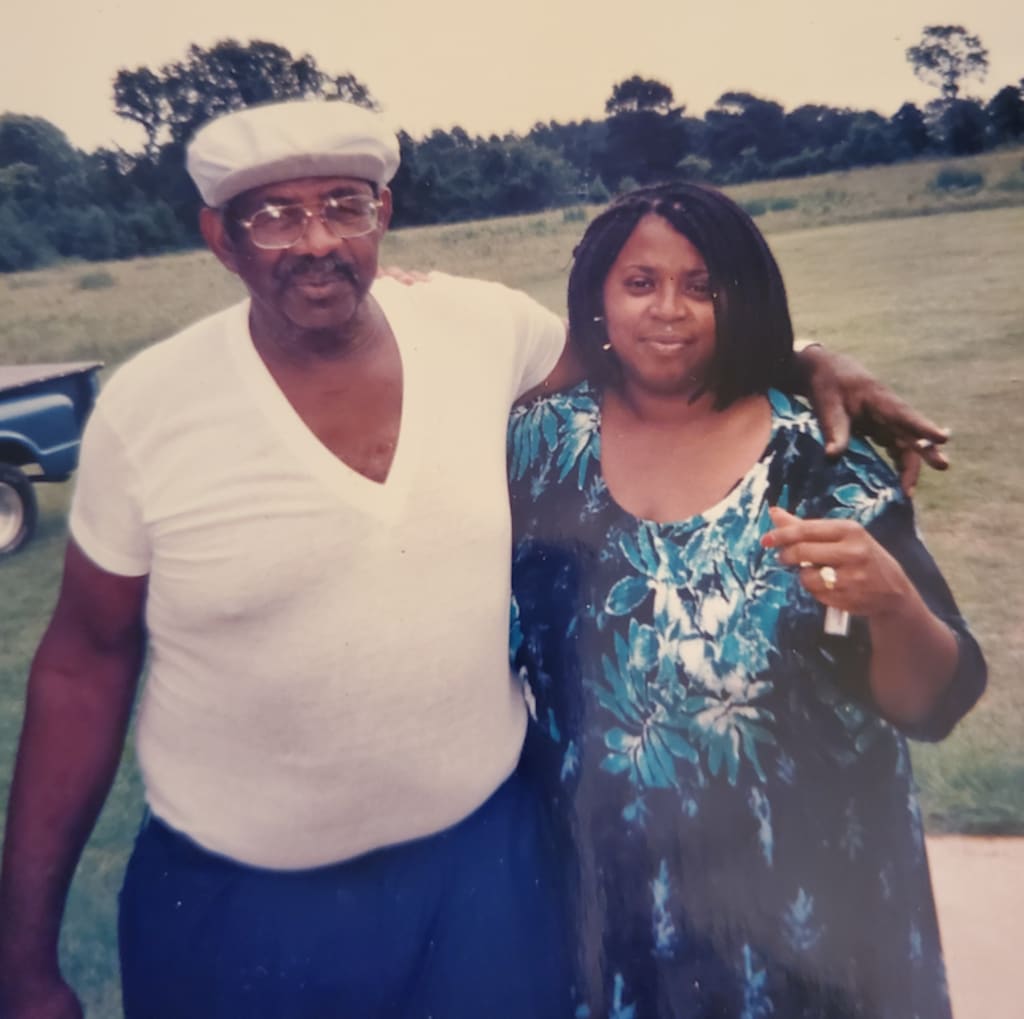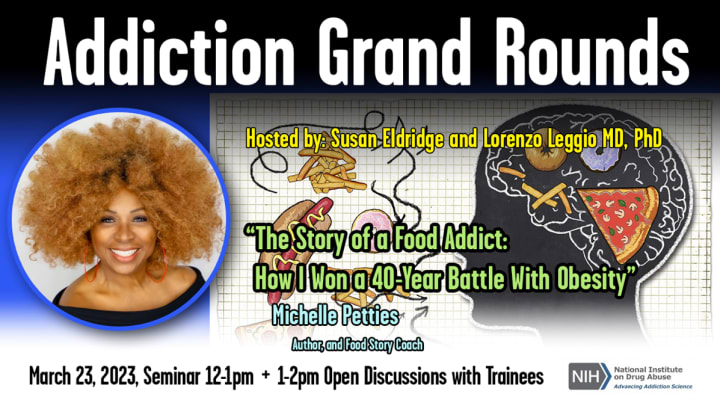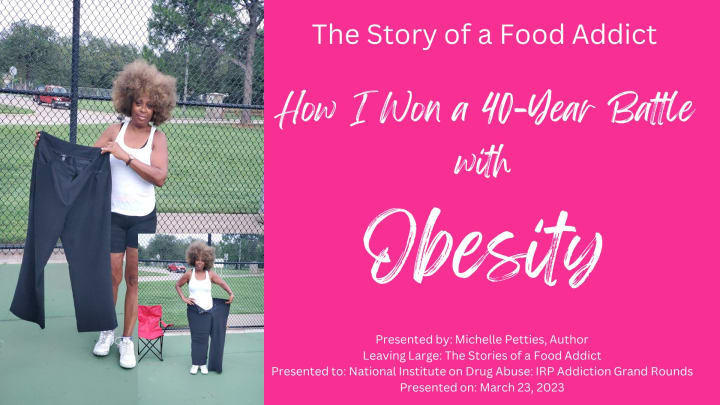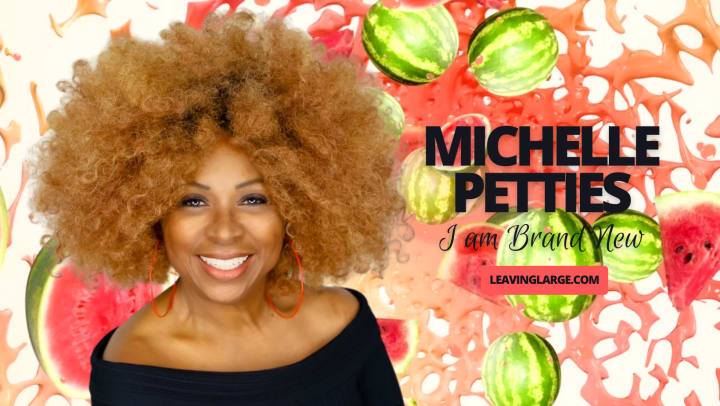WHERE IT ALL BEGAN
How a family gathering uncovered a food story that would help me discover my own

It was March 23, 2023, at 2 pm and I had just finished a midday presentation to a Zoom filled with respected doctors, scientists, researchers, and other stakeholders from the National Institute on Drug Abuse at the National Institutes of Health, one of the world’s foremost research centers. And judging from the feedback, comments, and questions, my talk was a success. How did I, a 65-year Black woman from the small-town south, land in such an esteemed space? A few months ago, I met Dr. Lorenzo Leggio – a Senior Investigator (Clinical) in the NIH Intramural Research Program (IRP) with faculty appointments both at NIDA and NIAAA, and Chief of the Clinical Psychoneuroendocrinology and Neuropsychopharmacology Section, a joint NIDA and NIAAA laboratory – at a health fair. He was intrigued by my new memoir, Leaving Large – The Stories of a Food Addict, interested in my unique perspectives about processed food addiction, and invited me to share my story and insight during Grands Rounds. That’s the obvious conclusion, the simple answer. But the truth is, it’s a bit more circuitous and complex than you might think.
That March 23rd presentation would have never happened had it not been for a hot summer day in 1930s Marshall, Texas, and a stolen watermelon.

Where it all began
The seed for the book that captured Dr. Leggio’s attention was planted at a family cookout on my uncle’s farm in the summer of 1996. It all began when I asked my favorite uncle if he wanted some watermelon. I had figured he would say yes. After all, the watermelon on the table that day was bright red, big, and juicy. It looked so sweet and refreshing. I couldn’t wait to dig into its cool, crisp deliciousness.
“Billy,” I said, using the only name I ever called my uncle. “Do you want some of this watermelon?”
“No,” he replied, totally disinterested.
“Why?” I asked. “Do you not like watermelon? Are you just not hungry? Do you want some later?”
I just had to know why. Everyone else was enjoying a few slabs. But not Billy. I thought it was odd.
“I don’t eat watermelon,” Billy explained, still disinterested.
“But why not?” I asked. “You don’t like it?”
Realizing that I am not about to let this go, my uncle, who was in his late 70s by then, finally relented and told me the story that would – years later, at least – forever change my beliefs about food, why we crave and even why we binge on certain kinds of food.
A life-altering experience
As it turns out, my uncle’s disinterest in watermelon had nothing to do with taste. In fact, as a child, he had quite a fondness for watermelon. So much so that – when he was about 7 or 8 growing up in Marshall, Texas – he and some of his friends stole a watermelon from a neighbor’s garden. It was done more out of a sense of adventure and something fun to do to cool off on a hot summer day, than anything else.
But what was supposed to be fun soon took a turn for the worse. When his father, also my grandfather, found out about the incident, he was not happy about it at all. So, my grandfather – his arms strengthened by years of pounding nails into railroad ties as a Texas railman – proceeded to beat my uncle with a belt for all he was worth. There was no way that my grandfather, who also served as a church trustee, would let anyone think that his son was a thief or that he wasn’t providing for his family. He administered a whipping that my uncle clearly never forgot. My uncle had not eaten watermelon since.
I was saddened and deeply shaken by his story. But I still had a question.
“Well, Billy, that was over 70 years ago,” I said. “Now, that you look back, do you think maybe the lesson was supposed to be, ‘thou shalt not steal’?”
“I don’t eat watermelon,” he said.
Resigned, I left it at that.
In search of pleasure
Many years later, I reflected on this story, and it hit me: My uncle’s experience with watermelon was so traumatic that – even after seven decades – he still could not bring himself to eat it. The memories associated with this food that he once loved as a boy were just too painful to want to experience again.
This led me to ask yet another question. Could the opposite be true? Is it possible that my cravings and binges – and really anyone’s cravings and binges – were all rooted in certain memories and experiences that were so pleasurable that they were driving us to do just the opposite and to eat certain foods uncontrollably? Is it also possible that, like my uncle who had come to reject a certain food because of a bad experience with it, we subconsciously crave certain foods because they are associated with certain good experiences?
The answers to these questions informed my discovery of my Food Identity, which I define as the way we think, act, feel, and move around food. Our Food Identities are born out of our Food Stories, the events, experiences, and memories that form our beliefs, attitudes, and habits about food, eating, and hunger. Navigating through my own personal Food Stories helped me to develop an individualized process to finally manage binging, cravings, and overeating.
Throughout this journey, I figured out how to find, face, and rewrite my toxic Food Stories and replace them with brand-new Food Stories. Changing my Food Stories, enabled me to change my Food Identity. When I changed what food means in my life and separated my food interactions and experiences from the feelings they evoked, the scale started moving in the right direction. This put me on a path toward wholeness and well-being as I began to experience freedom from addiction for the first time in my life.

Finding your Food Stories
In my book, I share a series of Food Stories that kept me trapped in – and ultimately released me from – a 42-year cycle of obesity and yoyo dieting. “Leaving Large” is a collection of my personal Food Stories, learnings, and lessons that transformed my mind and body. My journey through these Food Stories allowed me to discover the peace, pride, confidence, freedom, power, and joy hidden beneath 700 pounds of extra weight. (That’s how much weight I lost when you count all the back and forth, I experienced between losing 50 pounds here and there only to gain it all back, a pattern I repeated over and over.)
We all have Food Stories. My Food Stories, then, are not about me. They are universal. They are about us. We all have Food Stories to tell. We may not recognize them for what they are, or even focus on them or how they came to be, or how they control us. And so, we go through life mindlessly eating excessively large portions of this and that – whether it’s crab legs or chicken wings, potato salad or apple pie – because our Food Stories are ruling our beliefs.

A Food Story Movement
Presenting the truth in my Food Stories is my gift to the two out of five Americans that are battling obesity. I am on a mission secret to leave those statistics in the dust and raise awareness of how everyday events, experiences, and memories inform our beliefs, attitudes, and habits around food, eating, and hunger, revealing that the answers to why we eat, and what we eat rest in our Food Stories.
I finally figured out a way to stop eating for all the wrong reasons, looking to food for joy, entertainment, companionship, pleasure, comfort, and status, and using food to mask stress and daily discomforts that I never allowed myself to feel. Now, can share with anyone who is ready how to make peace with their mind, body, and eating – all because of that almost-forgotten watermelon story.
About the Creator
Michelle Petties
We all have unique stories that lead us. I speak to organizations, large and small, sharing unique perspectives and my story of hope, healing, and triumph. Need an engaging, thought-provoking, and transformative speaker? Ping me.






Comments
There are no comments for this story
Be the first to respond and start the conversation.